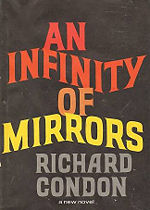An Infinity of Mirrors: Difference between revisions
imported>Hayford Peirce (added all the headers as a framework for future editing) |
imported>Hayford Peirce (added the Time review) |
||
| Line 5: | Line 5: | ||
'''An Infinity of Mirrors''', first published by so-and-so in 1964, was the fifth novel by [[Richard Condon]]. | '''An Infinity of Mirrors''', first published by so-and-so in 1964, was the fifth novel by [[Richard Condon]]. | ||
==Critical reception== | ==Critical reception== | ||
''Time'' magazine was not greatly impressed by Condon's latest offering and gave it a fairly cursory review: | |||
<blockquote> Richard Condon's apocalyptic pocketa-pocketa has produced a resplendent collection of giants, ogres and drowsy princesses, all flimsily disguised as people. They reappear in this grim foray into Hitler-corrupted Germany, but the author of The Manchurian Candidate has turned from dismayed humor to dismaying homily. Condon's current princess is an enormously wealthy, unbelievably beautiful Frenchwoman; though Jewish, she is married to a monocle-twirling Prussian general who cannot see the evil of Hitler until their adored child dies in a Jewish concentration camp. They retaliate by consigning the guilty SS officer to a grisly fate. However, the novel does not keep its implicit promise to find meaning in mankind's acquiescence in evil. Worse, Condon's stylistic limitations, which hardly matter in a farce, cripple a serious novel. As an old Hollywood press agent and the possessor of a considerable comic talent, he should recall the studio adage that messages are for Western Union.<ref>"Also Current: Sep. 4, 1964", ''Time'' magazine at [http://www.time.com/time/magazine/article/0,9171,830620,00.html#ixzz0n6F0b7Xh]</ref> | |||
==Title== | ==Title== | ||
Revision as of 17:15, 5 May 2010
An Infinity of Mirrors, first published by so-and-so in 1964, was the fifth novel by Richard Condon.
Critical reception
Time magazine was not greatly impressed by Condon's latest offering and gave it a fairly cursory review:
Richard Condon's apocalyptic pocketa-pocketa has produced a resplendent collection of giants, ogres and drowsy princesses, all flimsily disguised as people. They reappear in this grim foray into Hitler-corrupted Germany, but the author of The Manchurian Candidate has turned from dismayed humor to dismaying homily. Condon's current princess is an enormously wealthy, unbelievably beautiful Frenchwoman; though Jewish, she is married to a monocle-twirling Prussian general who cannot see the evil of Hitler until their adored child dies in a Jewish concentration camp. They retaliate by consigning the guilty SS officer to a grisly fate. However, the novel does not keep its implicit promise to find meaning in mankind's acquiescence in evil. Worse, Condon's stylistic limitations, which hardly matter in a farce, cripple a serious novel. As an old Hollywood press agent and the possessor of a considerable comic talent, he should recall the studio adage that messages are for Western Union.[1]
Title
The title, as is the case in five of Condon's first six books, is derived from a fictitious Keener's Manual mentioned in many of his earlier novels: "God surrounded me with an infinity of mirrors which repeat my image again and again and again."
The sentence is found in as an epigraph on a blank page six pages after the title page and three pages before the beginning of the text.
Theme
Characters
Typical Condon quirks and characteristics
References
See also

